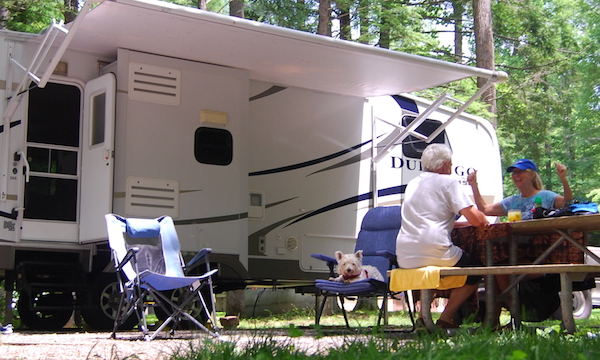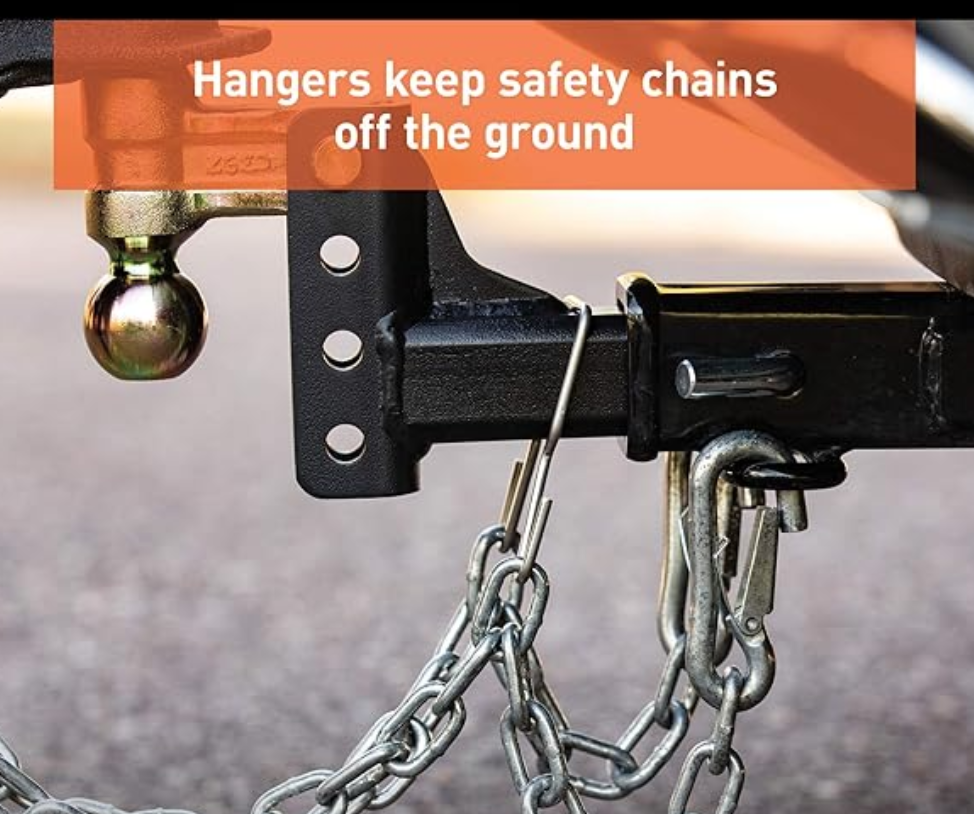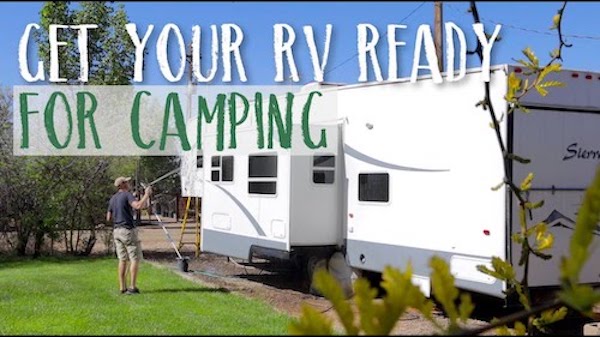What can I safely maintain on my own RV? When do I need to call the experts?
The flowers are starting to bloom, the days are getting longer and we are all thinking of getting our RV back out on the road for some adventure!

Before you head out this spring, you should consider that your RV has been in hibernation all winter and you should prepare your RV with a few RV maintenance tips before heading out on your first trip.
Some items to inspect or maintain:
- Water heater flush and inspect anode if applicable
- Inspect inside lower rear hatch of refrigerator, if you have the propane type fridge
- Brakes and bearings
- Tire condition and pressures
- Torque lug nuts on wheels
- Open all windows and roof vents to freshen up
- Inspect the backs of cupboards and shelves for ants, mice, and water leaks
- Check the corners of the rooms, sliderooms, and where the walls meet the floor for water marks from leaks
- Check under windows for leaks or water marks on the wall under the windows and under roof vents
- Look at the ceiling at the roof vents and corners. Note if there are water stains or mould forming
- Check your tools to see you have the basic things you need for a tire change and minor repairs and maintenance
- Check the house battery condition including state of charge, the electrolyte level, and ensure there is no corrosion around the battery wires
Servicing your RV travel trailer can often be an afterthought for travellers and while many of us remember to take the tow vehicle in for a regular check-up, it is also essential to undertake regular maintenance of your camper trailer, fifth wheel or motorhome as well. Happy Campers RV Repairs have partnered with MySafeRV.com to give us some guidance on the importance of servicing your travel trailer. Just how much servicing RV owners can perform themselves depends on mechanical and technical capabilities.
Regular servicing helps prevent the risk of accidents, decreases expenses for possible repair jobs in the future and considerably extends the lifespan of your RV. In some instances, failure to perform regular servicing can even void your warranty. When travelling the country, travel trailers are often towed across harsh environments where excess dust from rough roads can wear suspension and wheel bearings. The gas and water plumbing system of your RV can also be affected by repetitive vibrations, and you may even find some electrical or waterproofing issues occur along the way. Unfortunately, failure to regularly service your RV significantly increases the likelihood of one or more of these issues occurring during your next trip.
Alan O’Neill of Happy Campers RV Repairs is a mobile service master tech and has explained the ins and outs of getting your RV ready for this spring. You can safely take your family on a camping vacation to your favorite spots. For preventative maintenance, it is best to opt for a full service, which includes the inside and outside of your RV and a thorough check of all seals.
Regular Service Routine
Service schedules on cars and trucks state a date of service, and miles to be driven, to indicate when the next service should be performed. If you service your travel trailer and only use it just once in a 12-month period, it is still due for its next service on the specified date. The service won’t be as extensive as on the RV with greater miles traveled. Even when it is used irregularly throughout the year, there are still many servicing factors to consider, such as bearings, axles and suspension, and the fact that if various appliances are left unused, the next time you switch them on may be the moment it fails. Weather can also cause havoc on roof and window seals.
Recording Mileage
Without an odometer on your caravan, you will need to keep track of the mileage. Simply record your tow vehicles odometer at the start and end of each trip and calculate the difference being mileage travelled. Keep these with your caravan records. Click here to see various log books available on Amazon
Essential Services
- Begin with the running gear of the unit, including the brakes, bearings, coupling, and chassis. It is also handy to record and compare information in a service handbook.
- Look over the RV’s seal condition, including an inspection of the seals around slide-outs, windows and hatches. Having an eye for detail will help you find any hairline cracks or a pinhole opening. It is also a good idea for a professional to check over the RV and prepare a seal condition report which may consist of some photographic evidence or just a verbal report. A professional’s report is also great if you are considering selling, prospective buyers will be confident that they are not buying a caravan with an expensive problem.
- Keep an eye out for any water damage inside the RV, which might present itself as stains, bubbling paint, or dimpling to the internal wall and ceiling ply. It is also important to check inside all cupboards for water damage. If you do discover water damage, you will find that a seal has opened or plumbing has leaked.
Additional Factors to Keep an Eye On
When servicing your RV, there are additional factors you must consider, such as:
- Tire pressures. The pressure of your travel trailer’s tires should be maintained at the manufacturers recommended pressure, and this information can be found on the VIN or compliance plate. You should check the tires for any signs of wear, as this may indicate the pressure requires correcting or there may be an alignment issue. Also check the date and age of the tires, which is stamped on each tire sidewall. Rubber also has the tendency to harden over time, particularly as the tires reach the end of their life, and when this occurs, they are more susceptible to blowouts. A tire blowout can be extremely dangerous and could cause you to lose control of the trailer, and the area around the tire can be severely damaged. It is also important to note that if you have your RV professionally serviced.
- In some instances, vital safety equipment may have been damaged, check for a broken breakaway switch, severed cables and flat batteries. Before every trip, hook your trailer to your tow vehicle or pickup and with the brake controller manually switched on, move the RV approximately one foot forward and this will indicate whether the breakaway unit is operating correctly or not. It is important to ensure the safety chains are not able to touch the ground which causes sparks and has been known to ignite wildfires. Look at the Curt Safety Chain Hanger, designed to keep chains from dragging.
- If you have a hot water service that has an anode rod, test that too. Failing to replace an anode in time could leave to the tank rusting, splitting and rupturing.

Don’t let your RV service be an afterthought. Regular maintenance decreases the likelihood of issues occurring on your next big trip and helps prevent costly repairs. If you are thinking about performing a DIY repair, keep in mind your capabilities, and if you are uncertain, always consult a professional. Remember, a regular service routine goes a long way in preventing the risk of accidents, decreases expenses for possible repair jobs in the future and considerably extends the lifespan of your caravan.
Spring Check List
Battery
- Remove the battery from winter storage
- Check the water levels and refill if necessary
- Remove the terminals and clean the posts
- Reinstall the terminals and treat with battery terminal protector
- Give the battery full charge for at 72 hours or three days. Then remove the battery from the charger, leave for another 24 hours and measure the state of charge. If the battery is 12.6 volts or more, then you have a strong battery. If it is lower, consider changing the battery soon. It will not provide much current if you boondock often.
Jacks and levelers
- Operate jacks and leveler to ensure free movement.
- Lubricate scissor jacks with heavy duty silicone spray to keep them running smooth during the summer
Tires
- Check tire pressure
- Inflate to manufacturer’s specifications. Tires have maximum pressure limits. Check you are within these limits.
- Check condition of sidewalls and tread depth. Observe tread wear. Unusual wear and flattened tread indicates a possible fault in the suspension and should be checked by a professional.
Slide-Outs
- Operate slide-outs to ensure free movement.
- Lubricate moving parts with heavy duty silicone spray to keep them running smooth during the summer. Do not use grease on these parts because grease will attract dust and cause extra wear.
Roof
- Inspect the roof seal for any cracks, separation, pin holes, and soft zones
- Reapply seals as needed
- Clean the roof with appropriate products. Check your manual to learn what is approved for your roof materials. Water an minimal detergent is suitable.
- Treat roof with UV protectant to protect against the sun’s rays
Air-Conditioner, Refrigeration, Furnace, Hot Water System
- Have a professional thoroughly check the operation of all your appliances
- Ensure. you have adequate fire safety devices
- Inspect the water heater only after it has cooled and all power and propane is shut off

